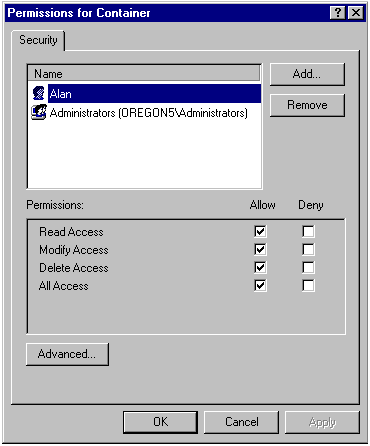
| Platform SDK: Access Control |
The basic security property page is the starting page of the property sheet displayed by the EditSecurity function. You can also use the CreateSecurityPage function to create a basic security property page to insert in your own property sheet.
The following illustration shows a typical basic security property page.

The property page displays a list of the trustees named in the ACEs of the object's DACL. The page also contains a list of the access rights supported by the object. When the user selects a name from the list of trustees, the checkboxes next to each access right indicate the rights that are allowed or denied for that trustee. The user can then click in the checkboxes to modify the trustee's access rights. The user can also add or remove trustees from the list.
The basic security page cannot display complex ACEs, such as object-specific ACEs . It also does not display ACE inheritance information. To enable the user to view or edit such information, you can include an Advanced button on the basic security page. The user can click the Advanced button to display an advanced security property sheet. This property sheet has property pages that enable the user to edit the object's SACL, change the object's owner, or perform advanced editing of the object's DACL. To display the Advanced button, set the SI_ADVANCED flag in the SI_OBJECT_INFO structure returned by your ISecurityInformation::GetObjectInformation implementation.
You can use the pszPageTitle member of the SI_OBJECT_INFO structure to specify the title of the basic security property page. The default title is Security.